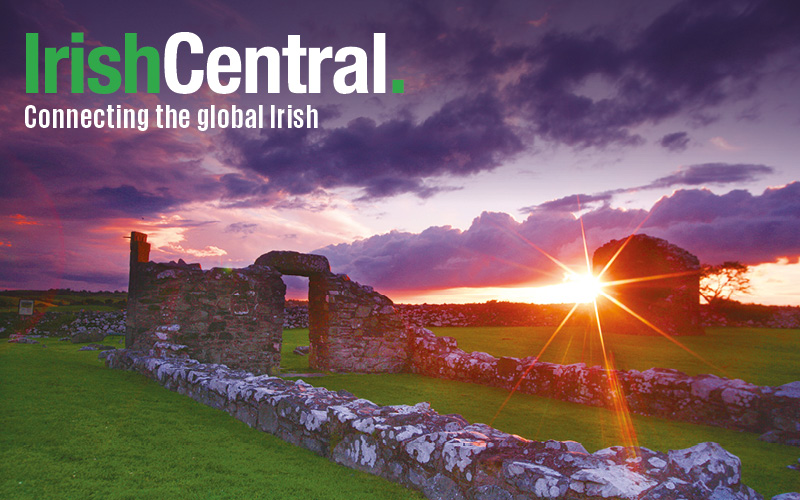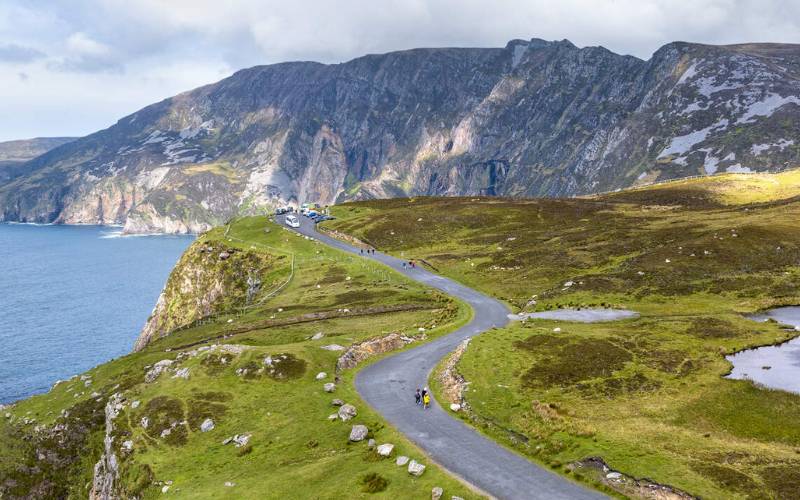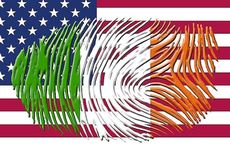As is to be expected, everyday Irish people will give queen Elizabeth "Windsor" a tear-soaked welcome when she parades about Ireland in 2011.
The good news is that this inevitable propaganda stunt will happen while Mary MacAleese is still in office. No queen compares to her.
The over-whelming theme of media reports next year in Ireland are going to be about tolerance and how the Irish are hate-free and above all that past nonsense. They'll kowtow and salute the foreign queen familiarly, and blow kisses and comment about how lovely she is.
The last Sax-Coburg queen to visit was the famine queen, Victoria--a well-fed woman with a penchant for black. She excused and mourned on behalf of her landed gentry, the wholesale exportation of Irish produce so that it would cut down the Irish population.
Monarchy thinks of democracy in the way Victoria thought of "her" shamrock people--weeds in "her" garden with a dangerous knack for democracy. Yet monarchy is always love--in appearance. It gives speeches to rival Christ for compassion. Monarchy is the most humble, the most charitable, the least greedy and all around prettiest mask the devil ever wore in human history. And its organic purpose as an expanding feeding clan of rich people and their friends is to convince those without blue blood that they are human animals whose existence is at the grace of the crown.
Peasants find citizenship a burden, or so our modern world seems to reveal. We pretend feudalism is dead, but would do better to carefully examine the modern queen for what she really is and what feudal restoration hopes she represents. The Irish media response to her visit--for England's sake--could be to dissect the machinations of the dynastic powers. No people are more in need of liberation from the British establishment than are the English themselves. Ireland's role in modern history has been to inspire liberation from just that parasitical establishment.
The fictions of British statecraft secure a rigid class system in England whence Ireland bravely sought and won redress.
Chief among the fictions, are the so-called British royals themselves who as part of an old German family have gotten very good at assuming native Welsh romances and other Celtic mystiques for their own. They changed their last name from Sachsen-Coburg-und-Gotha during World War 1 in order to hide their relationship to the German royals of the same name. Similarly, king Edward "Windsor" of England who stepped down in 1936, was unquestionably aligned with Hitler during World War 2, as Prince Harry would be aware.
Humanitarians like Roger Casement hated the pretty faces of empire and exalted human liberation in Ireland and Africa and all the former colonies. 1916 was followed by anti-royalty revolutions all through the 20th century and across the earth. India's flag invokes Ireland's, as the tri-color hailed France. Ireland's cause was invoked by nationalist liberators everywhere, as they dismantled the crown's tax. It's sad that Irish people today are so blandly assimilated into popular Anglo-American media, that they scoff knee-jerkedly at the achievements of Irish freedom--the inspiration for so many other countries.
The Irish media could use the opportunity of the queen's visit in 2011 to revisit Casement's critique of empire. Royalty should be given the going-over: the suspicious circumstances of Diana Spenser's death; the tax drain and hidden costs of supporting a growing dynastic class of insatiable parasites; the dangers of investing all feelings of national identity in their personages; the undemocratic access of Privy Council to state secrets and insider trading in markets regulated for everyone else.
The last country Ireland needs to inspire to overthrow the monarchy, is England herself.
Keep in touch with KeaneEdge articles and up-dates at GaelicGotham.com.
The good news is that this inevitable propaganda stunt will happen while Mary MacAleese is still in office. No queen compares to her.
The over-whelming theme of media reports next year in Ireland are going to be about tolerance and how the Irish are hate-free and above all that past nonsense. They'll kowtow and salute the foreign queen familiarly, and blow kisses and comment about how lovely she is.
The last Sax-Coburg queen to visit was the famine queen, Victoria--a well-fed woman with a penchant for black. She excused and mourned on behalf of her landed gentry, the wholesale exportation of Irish produce so that it would cut down the Irish population.
Monarchy thinks of democracy in the way Victoria thought of "her" shamrock people--weeds in "her" garden with a dangerous knack for democracy. Yet monarchy is always love--in appearance. It gives speeches to rival Christ for compassion. Monarchy is the most humble, the most charitable, the least greedy and all around prettiest mask the devil ever wore in human history. And its organic purpose as an expanding feeding clan of rich people and their friends is to convince those without blue blood that they are human animals whose existence is at the grace of the crown.
Peasants find citizenship a burden, or so our modern world seems to reveal. We pretend feudalism is dead, but would do better to carefully examine the modern queen for what she really is and what feudal restoration hopes she represents. The Irish media response to her visit--for England's sake--could be to dissect the machinations of the dynastic powers. No people are more in need of liberation from the British establishment than are the English themselves. Ireland's role in modern history has been to inspire liberation from just that parasitical establishment.
The fictions of British statecraft secure a rigid class system in England whence Ireland bravely sought and won redress.
Chief among the fictions, are the so-called British royals themselves who as part of an old German family have gotten very good at assuming native Welsh romances and other Celtic mystiques for their own. They changed their last name from Sachsen-Coburg-und-Gotha during World War 1 in order to hide their relationship to the German royals of the same name. Similarly, king Edward "Windsor" of England who stepped down in 1936, was unquestionably aligned with Hitler during World War 2, as Prince Harry would be aware.
Humanitarians like Roger Casement hated the pretty faces of empire and exalted human liberation in Ireland and Africa and all the former colonies. 1916 was followed by anti-royalty revolutions all through the 20th century and across the earth. India's flag invokes Ireland's, as the tri-color hailed France. Ireland's cause was invoked by nationalist liberators everywhere, as they dismantled the crown's tax. It's sad that Irish people today are so blandly assimilated into popular Anglo-American media, that they scoff knee-jerkedly at the achievements of Irish freedom--the inspiration for so many other countries.
The Irish media could use the opportunity of the queen's visit in 2011 to revisit Casement's critique of empire. Royalty should be given the going-over: the suspicious circumstances of Diana Spenser's death; the tax drain and hidden costs of supporting a growing dynastic class of insatiable parasites; the dangers of investing all feelings of national identity in their personages; the undemocratic access of Privy Council to state secrets and insider trading in markets regulated for everyone else.
The last country Ireland needs to inspire to overthrow the monarchy, is England herself.
Keep in touch with KeaneEdge articles and up-dates at GaelicGotham.com.




Comments